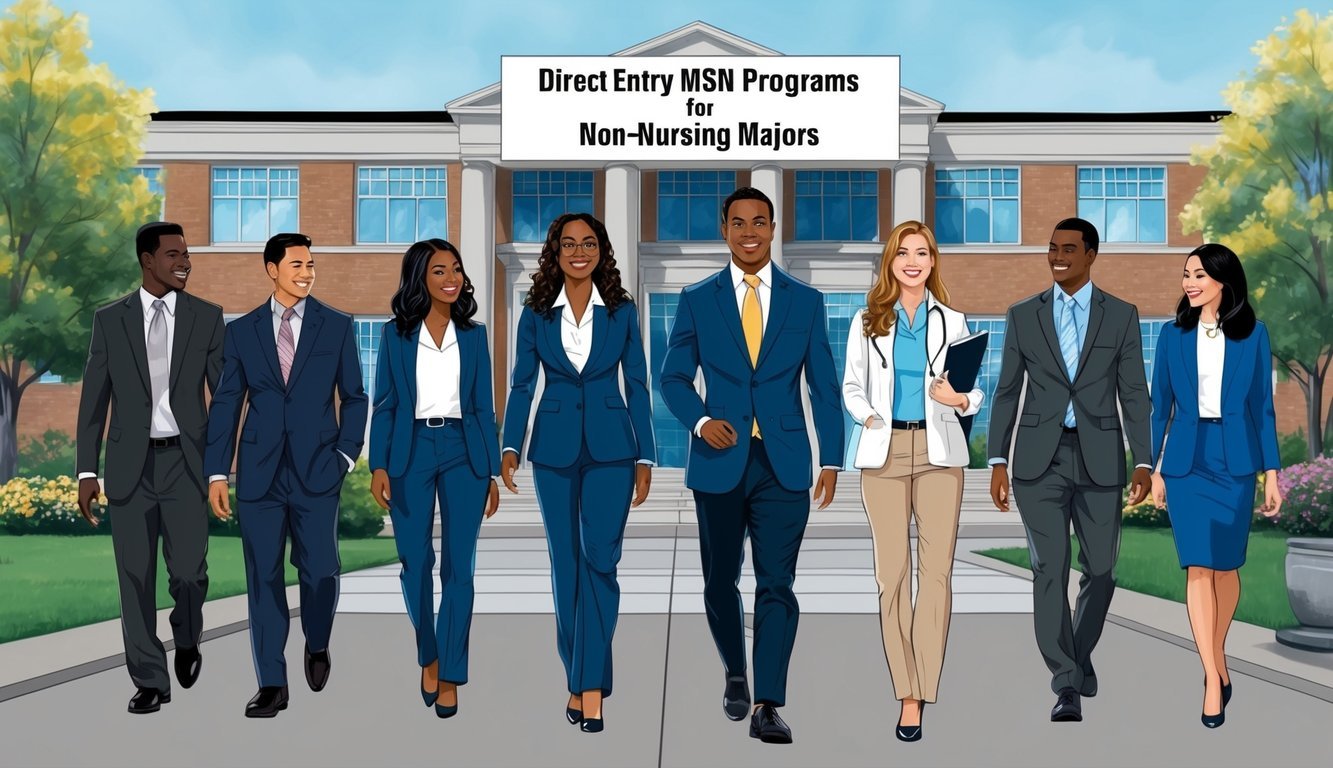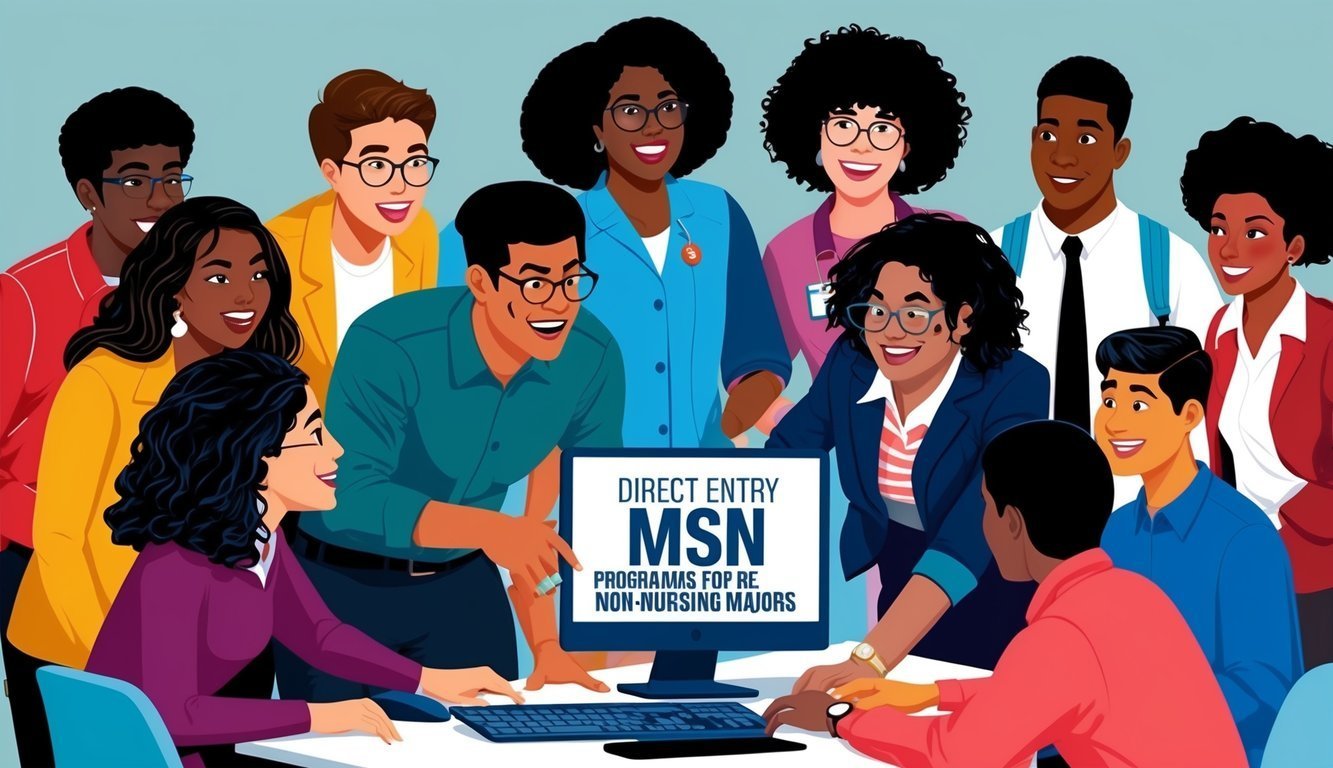If you’re a non-nursing major considering a career change into healthcare, direct entry MSN programs provide a compelling option.
These programs allow you to leverage your existing bachelor’s degree while earning a Master of Science in Nursing.
This enables you to enter the nursing profession faster than traditional routes.
As healthcare needs continue to grow, so does the demand for qualified nursing professionals, making this an attractive pathway.
Direct entry MSN programs are designed specifically for individuals without prior nursing education.
They combine foundational nursing courses with advanced practice training, ensuring you develop the necessary skills to succeed in the field.
Many institutions offer various online and campus-based options, allowing you to choose a program that fits your lifestyle.
For those interested in this rewarding career shift, extensive resources are available to guide you through the selection process.
Programs differ in duration, cost, and other factors, so it’s essential to research and identify the best fit for your needs.
By taking this step, you can transform your career and make a significant impact in the healthcare industry.
Understanding Direct-Entry MSN Programs
Direct-Entry MSN programs are designed for individuals with non-nursing bachelor’s degrees who seek to enter the nursing field.
These programs equip you with essential skills and knowledge to become a registered nurse while simultaneously working towards a Master of Science in Nursing degree.
Definition and Purpose
A Direct-Entry MSN program allows graduates of non-nursing bachelor’s degree programs to transition into nursing.
This specialized pathway combines undergraduate nursing education with advanced studies.
The primary goal is to prepare you for the NCLEX-RN licensure exam, enabling you to become an RN quickly.
You will gain both theoretical knowledge and clinical experience, crucial for delivering high-quality patient care.
These programs often integrate coursework on leadership, healthcare policy, and evidence-based practice, setting a solid foundation for advanced nursing roles.
Accreditation and Credibility
Accreditation is crucial for ensuring that your degree holds value in the job market.
Programs are typically accredited by the Commission on Collegiate Nursing Education (CCNE) or the Accreditation Commission for Education in Nursing (ACEN).
You should verify that the Direct-Entry MSN program you choose meets the standards set by the American Association of Colleges of Nursing (AACN).
Accredited programs enable you to qualify for licensure and receive federal financial aid.
Additionally, graduates from accredited programs often have higher employability due to recognized quality education.
Check for institution-specific accreditation to avoid potential issues after graduation.
Marquette University and Prominent Institutions
Marquette University offers a well-regarded Direct-Entry MSN program, emphasizing clinical practice and research.
This program typically spans 60 to 90 credits, depending on your previous education.
Marquette’s curriculum integrates a hands-on approach, allowing you to gain substantial clinical experience.
This is coupled with support for obtaining RN licensure, critical for advancing your nursing career.
Other notable institutions providing similar programs include Johns Hopkins University and Duke University.
They focus on developing nurse leaders prepared to confront today’s healthcare challenges.
Choosing a program from a recognized institution enhances your credentials and opens doors for future opportunities in the nursing field.
Admission and Prerequisites
Understanding the specific admission criteria and requirements is critical for a smooth transition into a direct-entry MSN program.
Here’s what you need to know to prepare effectively.
Admission Requirements
To apply for a direct-entry MSN program, you need to hold a non-nursing bachelor’s degree.
Most programs require a minimum GPA of 3.0.
Some schools may impose stricter standards.
Additionally, you may be required to submit:
- Letters of recommendation
- Personal statement
- Resume or CV
- Standardized test scores (if applicable)
Acceptance rates for these programs can vary significantly.
It’s advisable to research each institution’s acceptance data to gauge your competitiveness.
Essential Preparatory Courses
Most direct-entry MSN programs require you to complete certain prerequisite courses.
These typically include:
- Human Anatomy and Physiology: Fundamental for understanding body systems.
- Biology: Basics of biological sciences.
- Chemistry: Often includes both general and organic chemistry.
- Nutrition: Crucial for understanding dietary needs in patient care.
- Sociology or Psychology: Important for grasping human behavior and social contexts.
Completing these courses not only strengthens your application but also prepares you for the nursing curriculum.
Application Process Insights
The application process can vary between programs, but you should prepare to gather necessary documentation early.
Most programs operate through an online application system, allowing you to submit materials electronically.
Expect to pay an application fee, and keep in mind deadlines can be strict.
Research each program’s specific timeline and ensure you have:
- Transcripts from all institutions attended
- Completed prerequisite courses
- Any additional essays or interviews required
It’s beneficial to reach out to admissions counselors for any clarifications.
Program Structure and Curriculum
In a direct entry MSN program for non-nursing majors, you will engage in a comprehensive structure that combines theoretical and practical components essential for nursing practice.
The curriculum includes core nursing courses, clinical training, and various formats to accommodate diverse learning preferences.
Curriculum Overview
The program curriculum typically covers foundational nursing theory, healthcare policy, and nursing informatics.
Core courses may include subjects such as:
- Health Assessment
- Pathophysiology
- Pharmacology
- Nursing Research
You can expect to complete approximately 45-75 credit hours, depending on the institution.
The structure often integrates both asynchronous online coursework and synchronous live sessions.
Advanced topics specific to nursing practice and roles in healthcare are also included, preparing you for specialized areas like family nursing or public health.
Clinical Training and Simulation
Clinical training is a critical aspect of the curriculum, with programs usually requiring around 500-850 clinical hours.
This hands-on experience takes place in various healthcare settings, allowing you to apply your skills in real-world situations.
Training often utilizes a simulation center equipped with high-fidelity mannequins to mimic patient scenarios.
This setting enhances your assessment and decision-making skills, which are crucial for patient care.
Depending on the program, you may have multiple clinical rotations in different specialties, enabling you to gain valuable insights across various nursing fields.
Online and On-Campus Formats
You can choose between online and on-campus formats for your courses.
Many programs offer a blended format, allowing you to complete theoretical components online while attending in-person sessions for labs and simulations.
Programs typically span 20 months to 3 years, depending on your enrollment status—full-time or part-time.
Online classes provide flexibility, while on-campus attendance fosters collaboration with instructors and peers.
This combination creates a well-rounded educational experience tailored to your needs.
Licensure and Certifications

To practice as a registered nurse and pursue advanced roles, you must obtain licensure and relevant certifications.
This process ensures you meet the required standards and skills necessary for nursing practice.
Preparing for the NCLEX-RN
The NCLEX-RN exam is a critical step in obtaining your RN licensure.
It assesses your knowledge and competencies required to ensure safe and effective nursing care.
Here are key points to consider:
-
Eligibility: Before taking the exam, confirm that you meet all educational requirements, including completion of your direct-entry MSN program.
-
Preparation Courses: Many universities offer NCLEX review courses to help you get ready. Utilization of resources like NCLEX practice questions can also be beneficial.
-
Pass Rates: You should be aware of the NCLEX pass rates, which can provide insight into the competency of your schooling. Nationally, the pass rate has varied but typically hovers around 87%.
-
Exam Format: The exam employs computer adaptive testing, which adjusts difficulty based on your responses. Therefore, thorough study and practice are essential.
Obtaining Advanced Practice Credentials
Once you have passed the NCLEX-RN, you can pursue advanced practice credentials, enhancing your career options.
Consider the following advanced roles:
-
Advanced Practice Registered Nurse (APRN): To become an APRN, you typically need a master’s or higher degree. This allows you to specialize in areas like nurse practitioner or clinical nurse leader (CNL).
-
Certification Exams: Depending on your specialization, you may need to pass additional certification exams. For instance, CNL certification is governed by the Commission on Nurse Certification.
-
State Licensure: Each state requires its advanced practice nurses to have specific credentials and may administer their own exams.
-
Continuing Education: Many states require ongoing education to maintain both RN and advanced practice credentials. This ensures you stay updated in the rapidly evolving healthcare landscape.
Career Paths and Advancement

The direct-entry MSN programs open a wide array of career avenues for non-nursing majors.
You can explore various employment opportunities, establish yourself in specialties and leadership positions, and project long-term career growth in the nursing field.
Employment Opportunities
Upon completing a direct-entry MSN program, you can enter diverse roles in healthcare settings.
Common positions include:
- Registered Nurse (RN): The foundation of nursing practice.
- Nurse Practitioner (NP): Provides advanced care, often specializing in areas like family or pediatrics.
- Clinical Nurse Leader (CNL): Focuses on improving patient outcomes through effective leadership and management.
According to the Bureau of Labor Statistics, the demand for RNs is projected to grow by 7% from 2019 to 2029.
The growing emphasis on population health and preventive care ensures that there are ample employment opportunities across sectors like hospitals, outpatient care centers, and public health organizations.
Specialties and Leadership Positions
With your MSN, you can specialize in areas that align with your interests, such as:
- Family Nurse Practitioner (FNP): Delivers primary care across the lifespan.
- Certified Nurse Midwife (CNM): Focuses on maternal and child health.
- Public Health Nurse: Works to promote health and prevent disease at the community level.
Leadership roles such as nurse administrators or health services managers allow you to oversee teams and influence healthcare policies.
Enhancing your skills through certifications and continual education can prepare you for these roles, allowing for upward movement within the nursing profession.
Long-Term Career Outlook
The nursing field is seeing a rise in advanced practice roles, which often come with increased responsibilities and better salaries.
According to industry reports, nurse practitioners can earn a median salary of approximately $114,000 annually.
As you progress in your career, continuing education and specialization can lead you to higher leadership positions.
This pathway not only enhances your professional development but also significantly contributes to better patient care and health promotion initiatives within your community.
Financial Considerations and Outcomes

When pursuing a direct-entry MSN program, you must understand the financial implications.
This includes tuition costs, available financial aid, graduation rates, and potential career outcomes that influence your investment in education.
Tuition and Financial Aid
Tuition for direct-entry MSN programs can vary widely.
Costs typically range from $20,000 to over $100,000 depending on the institution and program specifics.
Many schools charge tuition per credit hour, often around $1,997 per credit.
Financial aid options include federal loans, scholarships, and work-study programs.
It’s important to explore each school’s financial aid offerings.
Contact the financial aid office for personalized guidance on available resources.
| School | Tuition Cost Range | Financial Aid Options |
|---|---|---|
| Elmhurst University | $40,000 – $60,000 | Scholarships, federal loans |
| University of Cincinnati | $20,000 – $50,000 | Grants, work-study programs |
| University of California-Davis | $30,000 – $80,000 | Federal aid, military benefits |
Graduation and NCLEX Success Rates
Graduation rates are a critical measure of program effectiveness.
Many well-established programs boast graduation rates above 80%, indicating strong support for students.
You should also consider NCLEX-RN pass rates.
High pass rates demonstrate that the program effectively prepares you for nursing licensure.
For example, several institutions report pass rates of 90% or higher, which is a positive indicator of program quality.
| Program | Graduation Rate | NCLEX-RN Pass Rate |
|---|---|---|
| Elmhurst University | 85% | 90% |
| University of Maryland | 80% | 92% |
| University of San Francisco | 82% | 91% |
Return on Investment
Evaluating the return on investment (ROI) is crucial for long-term financial planning.
A direct-entry MSN can lead to higher earning potential.
On average, advanced practice nurses earn $100,000 or more annually.
The job market for nurse practitioners is expanding, offering diverse career opportunities.
A solid program and supportive faculty can help you maximize your ROI through various career paths.
These include primary care and specialized fields.
| Career Path | Average Salary | Job Growth Rate |
|---|---|---|
| Nurse Practitioner | $110,000 | 45% (2020-2030) |
| Clinical Nurse Specialist | $100,000 | 10% (2020-2030) |
| Nurse Educator | $95,000 | 11% (2020-2030) |
Consider these factors carefully as you transition to a career in nursing.

